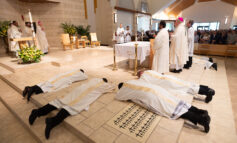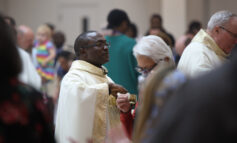By Father Thomas Esposito
Special to The Texas Catholic
On Jan. 25 of each year, the church celebrates perhaps the greatest conversion in her history: that of Saint Paul. His dramatic encounter with the risen Jesus, narrated three times by Luke in Acts of the Apostles (chapters 9, 22, and 26), marks a pivotal turn in the young Church’s life. Paul reveals in several of his letters that he received a special commission from God to announce that salvation, once offered to the Jews alone, has been extended to Gentiles as well.
While we rightly praise the providence that produced such a fearless apostle, we should also remember that Paul’s sudden allegiance to the Christian sect he sought to destroy created a problem for understandably suspicious Christians. His newfound vocation as a preacher of Christ was not instantly hailed as heaven-sent by the believers. The great missionary work of Paul would have been unthinkable were it not for one courageous disciple who rarely gets mentioned nowadays.
The name of that great man is Barnabas. A native of Cyprus and member of the priestly tribe of Levi, he stays in Jerusalem after the outbreak of the first persecution against the Christians, unleashed by none other than Saul of Tarsus (Acts 8:1-3). After his experience on the road to Damascus, Saul returns to the holy city seeking to align himself with the disciples of Jesus. These followers of the Lord were afraid of him, well aware that the man now preaching that Jesus is the Messiah of Israel had previously tried to annihilate them; they did not believe that he was a legitimate disciple, or that his motives were at all pure (Acts 9:26).
In this moment of great tension for the community, Barnabas calmly steps forward, brings Saul to the chief apostles (including Peter), and defends the genuineness of his conversion (Acts 9:27). Though Acts is silent regarding what prompts Barnabas to place his faith in Paul, he makes the first heroic move that will have immense consequences for the worldwide spread of the Gospel. He accompanies Saul to Antioch, where they together exhort the community to fidelity. Barnabas is described in Acts 11:24 as “a good man, full of the Holy Spirit and faith.” He is also identified as the foremost “prophet and teacher” in Antioch, the place where believers were called “Christians” for the first time (11:30; 13:1).
Barnabas then joins Paul on an initial missionary journey to Cyprus and Asia Minor (13:4-14:28). When Paul heals a crippled man in Lystra, the crowd attempts to worship the two disciples; the pagans acclaim Barnabas as Zeus, the head of the Greek pantheon of gods, and Paul as Hermes, the messenger god (14:8-20)! The two missionaries are instrumental in calling the “council” in Jerusalem, at which they, along with the other apostles, discern through the Holy Spirit that Gentiles should not be required to observe the precepts of the Jewish Law (15:1-32). After this meeting, Barnabas has an unfortunate disagreement with Paul over another disciple, John Mark, who had abandoned their first mission. Paul does not want Mark to join them on their next journey, and Barnabas decides to take Mark, his cousin according to Colossians 4:10, to Cyprus. Paul leaves for Asia Minor and Greece without Barnabas. After this parting with Paul, Barnabas is not mentioned again in Acts.
What fascinates me most about Barnabas is that he, an indispensable leader of the early Church, faded into such obscurity at the expense of Paul, the man whose evangelical career he made possible. Though his fame is totally eclipsed by Paul (not through any fault of Paul’s, I should note), his life is a valuable witness to the fact that we must be content with the role God gives us to play in the drama of salvation. We may be asked to strut in the spotlight for a time, and then labor silently behind the stage curtain, as Barnabas did for the rest of his days. I like to think that he does not mind his relative anonymity; after all, his mission was faithfully carried out, and he has better things to ponder now than fleeting earthly fame.
Father Thomas Esposito, O.Cist., is a theologian and monk at the Cistercian Abbey of Our Lady of Dallas in Irving. His column appears occasionally in The Texas Catholic.



